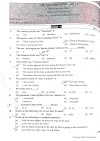Thermometry
Measurement of temperature is known as thermometry.
Thermometer is a device which measures temperature of a body.
Temperature measurement of a body works on the principle of thermal equilibrium.
Heat is a form of energy which is responsible for change in internal energy of a body.
SI unit of heat is joule (J).
Heat flows from body at higher temperature to body at lower temperature.
When there is no flow of heat between the bodies then they are said to be in thermal \quad equilibrium. Two system/bodies are in thermal equilibrium if and only if they have same temperature.
Temperature is a degree of hotness and coldness of a body.
SI unit of temperature is kelvin (K).
Temperature defines direction of flow of heat.
Temperature is a scalar quantity.
Temperature scales are defined on the basis of lower fixed points (LFP) and upper fixed points (UFP).
= ice points = temperature at which pure ice melts at normal pressure.
= steam point = temperature at which pure water boils at normal pressure.gives relative position of temperature reading with reference to LFP or UFP. This quantity is constant for all types of thermometers.
= = = =
= = = =
For change;
dC = dF = dR = = dK
On the basis of thermoelectric substances, thermometers are of three types; solid, liquid and gas thermometers. Platinum resistance thermometer, Radiation pyrometer, Magnetic thermometer, Thermocouple thermometer are solid thermometers. Mercury thermometer and alcohol thermometer are liquid thermometers. Constant pressure gas thermometer, constant volume gas thermometer, vapor pressure thermometer are gas thermometers.




.png)


.png)

0 Comments